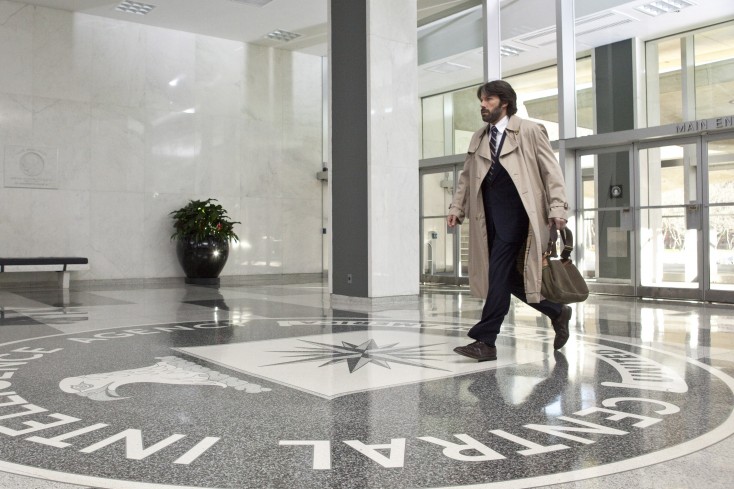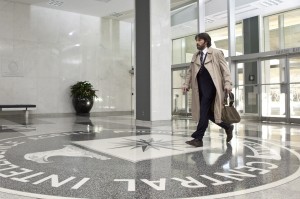By ANGELA DAWSON
Front Row Features
HOLLYWOOD—Ben Affleck has gone from leading man to a respected filmmaker the past decade or so. With the success of 2007’s “Gone Baby Gone” and 2010’s “The Town” under his belt, Affleck now tackles a historic drama involving a daring rescue in “Argo.”
The 40-year-old movie star initially read for the role of Tony Mendez, a real life CIA man who, in a rare and strange cooperative effort between Hollywood and the spy agency, organized a secret plan to extract six Americans embassy workers who had escaped capture from Iranian insurgents in 1979 by hiding out in the Canadian ambassador’s home for two months. Posing as a Hollywood filmmaker, Mendez gave the Americans false identities as his crew, and managed a daring escape from Iran while 52 other not-so-fortunate Americans were held captive in the Tehran embassy for more than a year.
An Oscar winning screenwriter (“Good Will Hunting”), Affleck explained his reasons for wanting to direct and star in “Argo,” during a press conference. He was drawn to the amazing true story, adapted into a screenplay by producer-turned-screenwriter Chris Terrio, and the producers on the project, George Clooney and Grant Heslov, who have a long track record of making smart, thought-provoking and entertaining films. The clean-shaven, short-haired actor was even willing to alter his appearance, much to his family’s dismay, to play the part of the ‘70s-era spy.
Q: How did you get involved in this project?
Affleck: When I got the script, I couldn’t believe how good it was. You often hear (producers say), “Oh yes, this is our best script,” and you usually think, “That’s an executive kind of hyping you on it,” but it really was pretty incredible. I talked to Grant (Heslov) and George (Clooney) and said, “Look, I really want to do this; this is amazing,” and they said, “Okay, great, let’s do it.” And so we took it to Warner Bros.
Q: What was it about the Tony Mendez character that got under your skin?
Affleck: I wanted to play him because the script was really interesting. What struck me almost right away was you have this thriller, and then in equal measure this kind of comic Hollywood satire and this really intricate real-life CIA spy story, and it’s all based on truth. So that seemed like a fantastically interesting and unusual movie to be part of. I really wanted to direct it, and then this sort of actor side of my brain—that is still in that phase of auditioning and trying to make connections and get work—asked the director of the movie for a job, and the director was in a tough spot and had to say “yes.”
Q: What did you try to convey about Tony onscreen?
Affleck: Tony is a very withdrawn guy. He’s not the conventional protagonist hero, beating his chest. He’s an inscrutable, opaque guy who kind of has this instinct from his days of being a spy to fade into the background, and I thought it was interesting to subvert the traditional Hollywood protagonist and have a guy in that position who kind of instinctively doesn’t want to be noticed, and have that guy have to make people do things they’re scared of doing because it’s necessary.
Q How much input did George Clooney have in the making of the film?
Affleck: The nice thing about working with Grant and George is it makes a big difference to have producers who are also filmmakers. They have actually done what you’re doing, and have done it really well and for a long time. They have experience both on the back end‑marketing, distribution, development and post-production—as well as being really supportive during production. So you kind of feel like you have a different kind of partner—somebody who’s got an intuitive sympathy for what you’re going through. Both of these guys have done it and done it well, so it was a great for me.
Q: John Goodman, who plays a Hollywood makeup artist who facilitates the connection Tony makes with the film producers to set up this bogus film, has a funny comment in the movie about how easy directing is. He says even a monkey could do it.
Affleck: How do I compare with a chimp, in other words? (He laughs.)
Q: What was the most difficult scene to shoot?
Affleck: The most challenging thing was the big extras scene (in Turkey). Grant and I and our line producer (Alex Sutherland), everybody kind of got it. It was a long lead up to trying to get thousands of people to show up (and) a lot of anxiety about whether they would, and then there were some issues because it was harder to get younger people, and (we were trying to depict) a student revolution. We didn’t want to look like a riot at the senior center, so we tried to make it as real as possible and it required a lot of people and a lot of wrangling, and worry, because you have 2,000 people. If some of them were cold, they would just go home.
Q: How did the Jimmy Carter narration at the end come about?
Affleck: I wanted to hear Carter’s voice saying to the audience, “Really, this took place,” and kind of cement that in the audience’s mind. Here’s the person who’s the President of the United States, who ordered this mission. We kind of talked about, saying, “Yes, it was a film crew. Yes, this is legitimate.” But I thought that would kind of work to lock in the narrative. I didn’t want it to be a referendum on the Carter presidency—that wasn’t the point. (We also didn’t want to) politicize the movie. So it was a delicate balance and that’s why we used just the voice, because it seems like it could be him talking at a press conference or an interview from maybe 10 or 20 years ago. Chay Carter, who is a producer on the movie, interviewed President Carter and got this stuff out of him that was really directly about our movie and our story, and it’s kind of amazing.
Q: How do you feel about the Oscar buzz surrounding “Argo?”
Affleck: Right now, we’re just trying to get the movie out, and there isn’t anybody out there who’s paid a dime to buy a ticket yet to see this movie. When you work for as long as we all have on something like this, the focus is just on the audience coming to see it, because otherwise you’re a tree in the woods. Otherwise you spent all that time for a plastic disc, and the goal was to have it be as large a collective experience as possible.
Q: What reaction did you get at home when you grew out your hair and grew a beard for this role?
Affleck: My family unanimously hated the look for different reasons, but there was unanimity, a united front. My littler kids would say, ‘Why can’t you shave your beard?”—they called it “prickles”—and I’d say, “Oh, I got to wear this for work.” Finally, my daughter, Violet, said, “What kind of work would want you to look like that?” That’s a good question.
Q: What are the most important things that you’ve learned about filmmaking from each of the films you’ve directed?
Affleck: It’s a little cliché, so it’s probably not a great answer, but I’ve learned that you can’t make a movie that even works, much less is good, without really good writing and really good acting. So that lesson has led me to not be distracted so much by the other stuff going on in filmmaking, and to focus on the essence of a story, the words and the events and the way that those are interpreted by the actors. That philosophy has taken me to a place that I really like.
Q: What are the positive and negative aspects of filmmaking when producing, acting and directing at the same time?
Affleck: No matter what you’re doing, if you’re trying to make a movie, you need to be working with people who are really good and make you better, and so I’ve got a lot of titles in front of my name and stuff, but this movie works as well if not better than anything that I’ve been involved in because of the amazing cast that I put together. (I also credit) Chris Terrio’s script and my partnership with the producers. I was in an incredibly enviable position in that sense. I had a lot of partners in doing this, and so it kind of makes all those different tasks better. Moreover, I don’t see (those jobs) as necessarily distinct. it’s all part of filmmaking, so it’s hard for me to distinguish and put each job in its silo.






